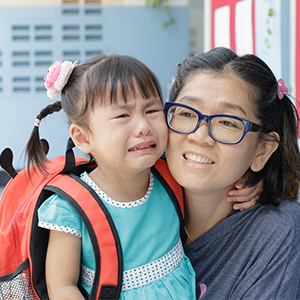Joe is a preschooler who cries when his mother drops him off at
school, so his mother often lets him stay home.
Maria, age 7, is fearful of going to bed by herself, so one of
her parents often stays with her to fall asleep.
Six-year-old Zack complains about a stomach ache whenever he
has a baseball game, and his dad often lets him go to the game
late since he’s not feeling well.
These are examples of children who might be having anxious feelings. As
parents, our hearts naturally go out to our kids. We want to make them feel
better and we often do this by accommodating for their fears.
Unfortunately, this well-intentioned act can make the anxiety worse. So,
what are some other ways to help children deal with anxious thoughts and
feelings?
Explore Emotions and Accept Them
The first thing parents can do is let children know their emotions are OK.
One of the most effective ways of doing this is through Emotion Coaching.
John Gottman, author of “Raising an Emotionally Intelligent Child,” offers
five steps of Emotion Coaching:
- Be aware of your child’s emotion.
- View this display of emotion as an opportunity for connecting and
teaching. - Listen empathetically and validate your child’s feelings.
- Help your child learn to name the feeling.
- Set limits that encourage the child to solve problems or deal with
upsetting situations.
In the example of Joe, the preschooler who cries when his mom brings him to
school, his mother might acknowledge that Joe is having a strong emotion
and view it as an opportunity to have a special conversation. At a time
other than drop-off, she could bring up the subject and help Joe explore
the feelings behind his crying. Rather than trying to get him to feel a
different way, she would acknowledge his feelings and help Joe build his
feeling vocabulary by guessing at his feelings. Examples of this include “I
wonder if you feel sad when I leave you” or “I wonder if you might feel
confused about whom to play with first at school.”
Teach Courage
While it is important to acknowledge and validate a child’s emotions, it is
also important for children to learn not to avoid giving in to anxious
feelings, as that can feed the anxiety. Instead, teach them courage. For
example, Joe’s mother might help him learn to solve problems by asking him
to brainstorm ideas for making the transition easier at drop-off. When
parents involve children in problem-solving, they are often amazed at what
good ideas kids offer! And if Joe is involved in the solution, it is more
likely to work. Consistently bringing Joe to school and leaving him when it
is time signals that mom has confidence that he will be OK – and that will
help him feel OK. When mom lets Joe stay home, he receives the subtle
message that she is worried and doesn’t have full confidence in him.
Being your child’s “historian” can also help foster courage. For example,
if your child is nervous about a public performance, remind her of another
time she was nervous and showed courage by performing in spite of the fear.
This helps the child feel confident in her abilities.
“Acting as if” is also encouraging to a child. If a parent acts as if a
situation is going to be OK for their child, it can go a long way in
helping the child manage it. For example, if the last time you went to the
pediatrician your child seemed anxious, do not assume that he will be
anxious the next time. Instead, “act as if” the child will not be anxious.
As you prepare for the appointment, have confidence that this visit will be
a bit better than the last one. Children often match their behavior to the
expectations of their parents, whether they are positive or negative.
Maintain Your Own Sense of Calm
A child who is feeling anxious needs a calm parent. Your solid, centered
presence can help lower the emotional temperature, so do what you need to
do to keep a handle on your own emotions. This may include yoga,
meditation, prayer, exercise or artistic pursuits. Lightening the family
schedule can make a big difference. If you sense that you need professional
help with your own anxiety, be sure you get the support you need.
When To Seek Help
If you find that anxiety is impacting your child’s life in a significant
way, you may wish to speak to your pediatrician about it. Dr. Bonnie
Zucker, in her book “Anxiety-Free Kids: An Interactive Guide for Parents
and Children,” writes that if your child’s anxiety interferes with academic
or social performances or the ability to enjoy life, it may be time to seek
professional support.
Eight Ways to Foster Courage
- Smile! A genuine smile is a powerful tool to let a child know that
things are going to be OK.
- Hug and cuddle. Our children need our physical closeness, even into
their tweens and teens.
- Offer opportunities to learn new skills and to take new risks.
- Allow your child to struggle with a problem.
- Allow your child to have her feelings, and don’t think you have to
rescue her from these emotions.
- Notice improvement.
- Acknowledge your child’s feelings and let your child know that feelings
come and go; they don’t stay forever.
- Don’t protect your child from her fears. Encourage her to figure out how
to deal with her challenges.
- Let her know that you appreciate how capable she is at dealing with
challenges.

